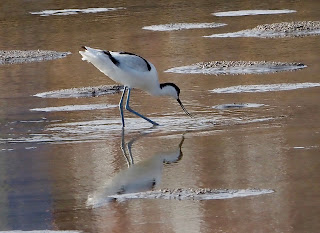Monday 5th February: Bourgas lakes and wetlands
Today we explored the local lakes, and despite a chilly start it soon warmed up into a beautiful spring-like day. We made several stops along the edge of Bourgas Lake. The star attraction here was some incredible rafts of Pochard, numbering into their thousands, their shining chestnut heads looking rather special in the bright sunshine.
 |
| Pochard |
A drake and Red-headed Smew were suddenly spotted amongst them, but unfortunately quickly took off before we got the scopes on them. A little more distant, I was thrilled when Dimiter called a group of White-headed Duck, a new species for me. These are an endangered species, and the cause of the Ruddy Duck being exterminated in Britain, as there is apparently a risk of hybridisation. Since the Ruddy Duck is an introduced American species, the White-headed Duck trumps the endearing Ruddy Duck in conservation terms.
The reed-lined water margins also provided some interest, with Pygmy Cormorant and Grey Heron moving furtively in pursuit of food, while a small group of Whiskered Terns scoured the area. A concrete platform in the lake provided a resting place for several Pallas Gull and a Black-necked Grebe also showed well.
 |
| Whiskered Tern |
From here, following our lack of rare geese in Romania, we set off in search of a large flock of White-fronts which Dimiter was aware of, with a few Red-breasted Geese reported to be amongst them. We travelled slowly along a farm track, noting several Hen Harriers and a Great White Egret along the way. Eventually we arrived at a derelict cottage, but just as we were about to leave the bus, frustratingly the whole flock flew up. A single Black Redstart on the fence line and an overhead Dalmatian Pelican offered some compensation and we decided to return later in the day when they would hopefully be more settled.
 |
| Dalmatian Pelican |
We moved on instead to Pomorie Lake and salt pans, where we found feeding Redshank, Avocet, Grey Plover and Dunlin, plus a couple of rather mobile Water Pipit along the water’s edge. On the open water a group of Red-breasted Mergansers were active and a few Shelduck and a single Pintail were found. At the far end a small group of Flamingoes were feeding and several Yellow-legged Gulls loafed on a platform. Further along the lake we had some good views of Black-throated Diver and Black-necked Grebe.
 |
| Avocet |
 |
| Flamingoes |
After lunch we returned for the Great Geese Hunt! This time we managed to arrive without flushing any birds, and quietly disembarked from the bus. Dimiter instructed us carefully how to stalk the geese so as not to disturb them; walk close together, voices quiet, scopes pointing downwards. Every 50 yards or so we stopped to check if they were remaining settled, I’m sure we must have made a comical sight - like a Roman battalion huddled beneath their shields, we slowly moved forward then stopped, move forward then stop. I tried very hard not to laugh, and we were occasionally scolded by Dimiter as wayward scopes slipped from the desired position! Eventually we were close enough to scan through around 40,000 distant geese in search of a Red-breasted. And eventually our efforts were rewarded, with a few fleeting glimpses of a crimson-red breast and distinctive black and white facial markings, confirming the ID. Suddenly, and actually to my relief, the birds were spooked again, and the search was over. We returned to the vehicle, noting a few Skylark skirting low across the fields and a herd of Water Buffalo on our way.



Comments